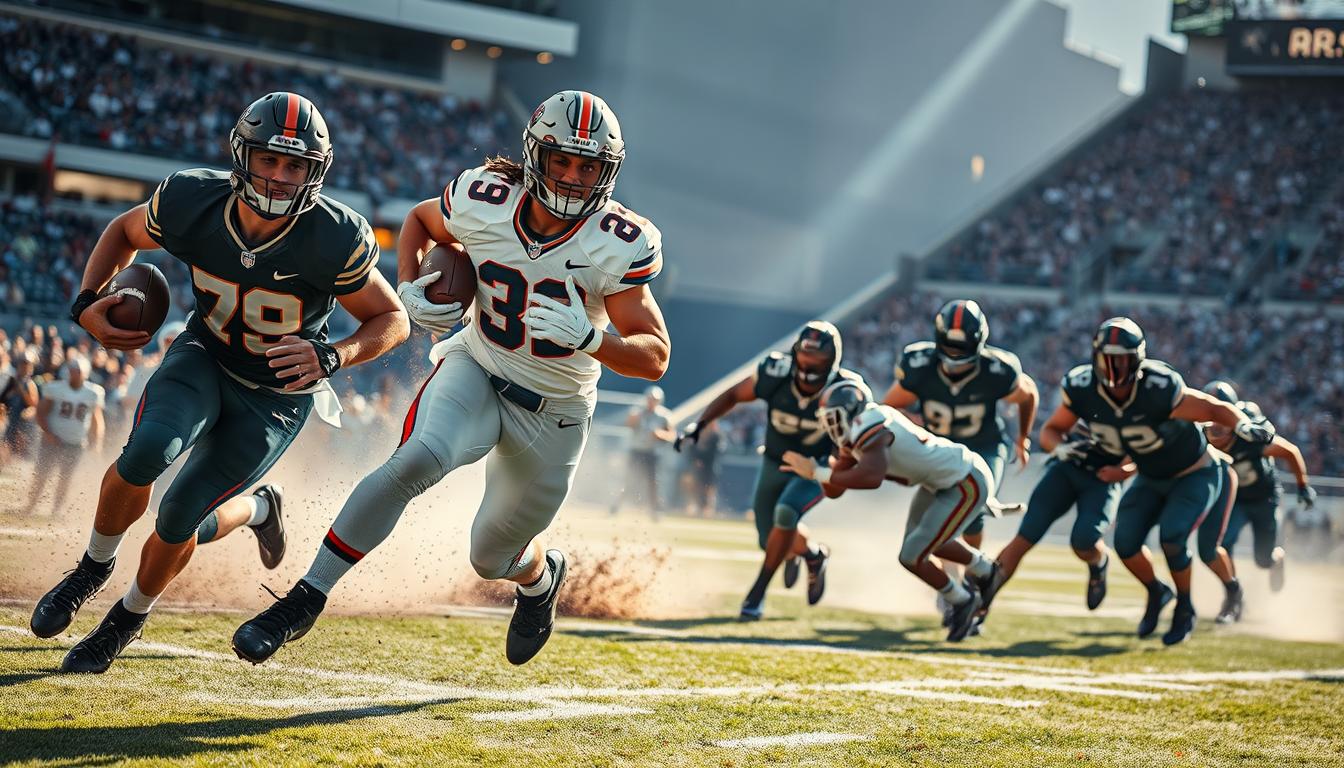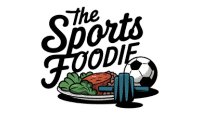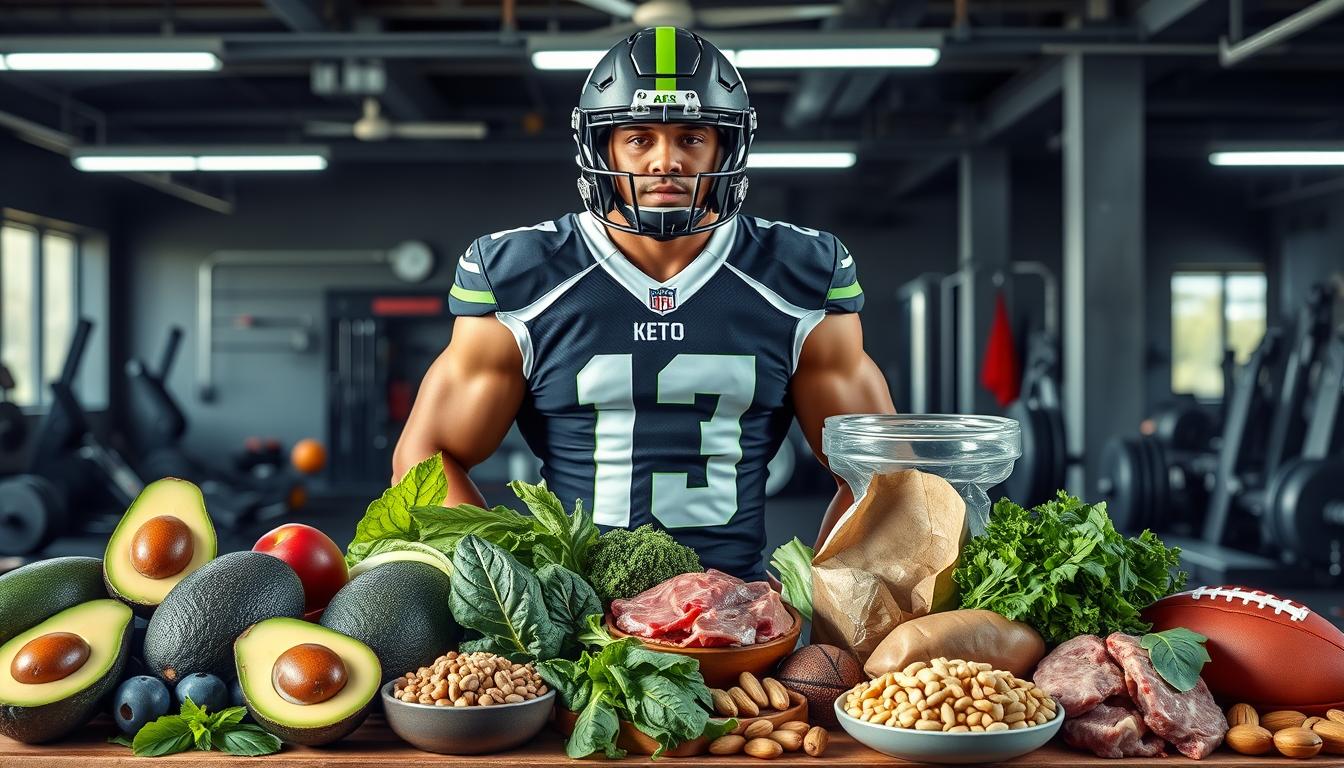If you play American football, you’re probably searching for ways to get better. The keto diet, which cuts down carbs and boosts fat, is getting a lot of attention. But is it good for you, and how will it affect your nutrition and performance?
The keto diet might help some, but it’s key to think about what you need as a football player. With the right advice, you can choose the best diet for your nutrition and improve your game. Let’s look at the good and bad sides of the keto diet for football players and how to use it to your advantage.
Understanding the Keto Diet Basics
To start the ketogenic diet, you need to know the basics. This diet makes your body burn fat for energy, not carbs. You do this by eating less carbs and more fat. The diet usually has 70-80% fat, 15-20% protein, and 5-10% carbs.
Success on this diet comes from the right food balance. You should eat lots of healthy fats, some protein, and very few carbs. Good fats include olive oil, avocado, and fatty fish. Protein comes from meat, poultry, and fish. Carbs are mostly in leafy greens and low-carb veggies.

Here are some key nutrients and macronutrient ratios to aim for on a ketogenic diet:
- Fat: 70-80% of daily calories
- Protein: 15-20% of daily calories
- Carbohydrates: 5-10% of daily calories
By sticking to these guidelines and staying in ketosis, you can enjoy the diet’s benefits. These include weight loss and better athletic performance.
Energy Systems in American Football
As an American football player, you know the sport requires a lot of energy and endurance. Have you thought about the different energy systems at play? From the phosphagen system to the oxidative system, each is key to your field performance. Understanding these systems is vital for improving your athletic performance and achieving success in American football.
The energy systems in American football include the phosphagen, glycolytic, and oxidative systems. Each system fuels different types and durations of activities. For instance, the phosphagen system is for short, intense activities like sprinting. On the other hand, the oxidative system is for longer, less intense activities like distance running. Knowing how these systems work helps you tailor your training and nutrition for better performance and goals.
Here are some key points to consider when it comes to energy systems in American football:
- The phosphagen system provides energy for short, high-intensity activities
- The glycolytic system provides energy for medium-duration, high-intensity activities
- The oxidative system provides energy for long-duration, low-intensity activities
By understanding and optimizing your energy systems, you can enhance your athletic performance and succeed in American football. This requires proper training, nutrition, and recovery techniques. With the right approach, you can unlock your full athletic ability and reach new heights in your sport.

How Keto Affects Athletic Performance
The keto diet can impact athletic performance in different ways. It might not boost endurance sports, but it could help with strength and power. For instance, a study showed that taurine, often used in keto diets, can increase average power output.
Yet, the keto diet might not be best for elite athletes needing quick energy. It can help with losing weight and fat, which is good for athletes in certain weight classes. To make the most of the keto diet, focus on good nutrition and staying hydrated. Here are some important tips:
- Eat a balanced diet with lots of protein, healthy fats, and low-carb veggies to fuel your body.
- Drink plenty of water and electrolyte-rich drinks, more so during and after exercise.
- Think about talking to a sports nutritionist or registered dietitian for a personalized nutrition plan.
By following these tips and listening to your body, you can use the keto diet to improve your athletic performance and reach your fitness goals.
| Nutrient | Recommended Daily Intake | Importance for Athletes |
|---|---|---|
| Protein | 1.2-1.6 grams per kilogram of body weight | Essential for muscle growth and repair |
| Healthy Fats | 0.5-1 gram per kilogram of body weight | Provides energy and supports hormone production |
| Carbohydrates | 2-3 grams per kilogram of body weight | Provides energy for exercise and supports recovery |
Keto Diet for American Football Players: Benefits and Challenges
If you’re an american football player, you’re always looking for ways to get ahead. The keto diet might help you out. It can improve your body shape, boost your energy, and clear your mind. For instance, Joe Thomas, a former NFL player, lost 60 pounds with a keto diet and fasting.
This weight loss did more than just make him look good. It also made him feel better mentally.
Some good things about the keto diet for football players are:
- Improved body composition
- Increased energy
- Enhanced mental clarity
But, it’s not all sunshine and rainbows. There are some downsides:
- It can be hard to stick to
- You might miss eating familiar foods
- It can be tough mentally, with doubts creeping in
Even with these hurdles, many football players have seen success with the keto diet. With the right help and support, you can beat these challenges and reach your goals.
| Benefits | Challenges |
|---|---|
| Improved body composition | Difficulty in maintaining the diet |
| Increased energy | Cravings for familiar foods |
| Enhanced mental clarity | Mental challenges, such as moments of doubt |
Body Composition Changes on Keto
On the keto diet, you’ll see big changes in your body. You’ll lose weight and build muscle. This happens because you eat less carbs and more fat. Your body then uses fat for energy instead of carbs.
The keto diet has a special mix of nutrients. It’s mostly fat, with some protein and a little carbs. This mix helps you lose weight and get in better shape. For athletes, it’s key for better sports performance.
- Weight loss: You can lose a lot of weight in the first few weeks.
- Muscle mass: The diet helps build muscle, if you also do resistance training.
- Body fat percentage: It can lower your body fat, making you leaner and more toned.
The keto diet is a good way to lose weight and improve your body shape. It works best when you also live a healthy lifestyle. By knowing how the diet works and making smart food and exercise choices, you can reach your goals.
| Macronutrient | Keto Diet Ratio | Importance for Body Composition |
|---|---|---|
| Fat | 70-80% | Provides energy and supports weight loss |
| Protein | 15-20% | Supports muscle growth and repair |
| Carbohydrates | 5-10% | Provides energy for high-intensity activities |
Timing the Keto Diet During Football Season
As an American football player, you know the season is long and tough. The keto diet can help improve your performance. But, timing is everything.
The keto diet is high in fat and low in carbs. It can boost endurance and lower injury risk. It’s key to start the diet at the right time to see benefits.
Off-Season Implementation
In the off-season, start by cutting carbs and eating more fat. This helps your body adjust and avoid fatigue.
Pre-Season Adjustments
As pre-season comes, tweak your diet for the right nutrients. You might adjust ratios or add supplements.
In-Season Considerations
During the season, avoid big diet changes. Stick to your diet and make small tweaks for better performance.
Timing the keto diet right can boost performance and reduce injuries. It’s a powerful tool for success, no matter the season.
| Season | Dietary Focus |
|---|---|
| Off-Season | Building strength and endurance |
| Pre-Season | Fine-tuning diet and adjusting macronutrient ratios |
| In-Season | Maintaining current diet and making adjustments as needed |
Essential Supplements for Football Players on Keto
As a football player on the keto diet, it’s key to think about supplements. They help support your performance and health. Supplements are important for filling nutritional gaps and boosting athletic performance on the keto diet.
Important supplements include protein powder, creatine, and electrolytes like sodium, potassium, and magnesium. These help with muscle growth, strength, and endurance. They also prevent muscle cramps and other issues from electrolyte imbalances.
Here are some key benefits of these supplements:
- Protein powder: supports muscle growth and repair
- Creatine: increases strength and endurance
- Electrolytes: prevents muscle cramps and other issues related to electrolyte imbalances
Choosing high-quality supplements is vital. Look for natural ingredients and avoid additives and fillers. Always follow the recommended dosages. It’s also wise to talk to a healthcare professional or registered dietitian to find the best supplements for you.
Adding these essential supplements to your keto diet can boost your health and performance. This helps you reach your goals as a football player.
| Supplement | Benefits | Recommended Dosage |
|---|---|---|
| Protein Powder | Supports muscle growth and repair | 1-2 scoops per day |
| Creatine | Increases strength and endurance | 3-5 grams per day |
| Electrolytes | Prevents muscle cramps and other issues related to electrolyte imbalances | 1-2 grams per day |
Meal Planning for Game Day Performance
As an American football player, you know how important game day performance is. What you eat before and after the game can greatly affect your performance. It’s key to plan your meals right to fuel your body for the best game day performance.
A good meal should mix protein, healthy fats, and complex carbs. You can have lean proteins like chicken or fish, complex carbs like brown rice or sweet potatoes, and healthy fats like avocado or nuts. Here are some tips for pre-game nutrition and post-game recovery:
Pre-Game Nutrition
- Eat a balanced meal 1-3 hours before the game, including protein, complex carbohydrates, and healthy fats
- Stay hydrated by drinking plenty of water or sports drinks
- Avoid heavy or greasy foods that can cause digestive discomfort
Post-Game Recovery
- Refuel with a balanced meal or snack within 30-60 minutes after the game, including protein and complex carbohydrates
- Rehydrate with water or sports drinks to replenish lost electrolytes
- Consider adding supplements like protein powder or creatine to support muscle recovery
By following these meal planning tips, you can improve your game day performance and support your health. Remember to stay hydrated, eat the right foods, and listen to your body’s nutritional needs.
| Meal Type | Food Options | Timing |
|---|---|---|
| Pre-Game | Chicken, brown rice, avocado | 1-3 hours before game |
| Post-Game | Protein shake, sweet potato, nuts | 30-60 minutes after game |
Position-Specific Keto Considerations
As an American football player, you know each position has its own needs. The keto diet might suit linemen better, who need lots of strength. To make the keto diet work for you, think about your position. For example, linemen might need more protein for muscle growth.
Skill position players, though, might need a different strategy. They need to be fast and agile. So, they might do well with more healthy fats for energy. By knowing what your position needs, you can make a keto diet plan that boosts your performance. Learn more about keto diets for athletes at keto diet resources.
Here are some tips for keto diets based on your position:
- Linemen: focus on high-protein intake to support muscle growth and repair
- Skill position players: focus on healthy fats to support energy production
By tailoring your keto diet to your position, you can improve your nutrition. Don’t forget to drink plenty of water and listen to your body. This way, you’ll get the nutrients you need to excel on the field.
| Position | Nutritional Needs |
|---|---|
| Linemen | High protein, moderate fat, low carbohydrate |
| Skill Position Players | High fat, moderate protein, low carbohydrate |
Hydration and Electrolyte Balance
As an athlete on the keto diet, staying hydrated and balanced in electrolytes is key. This helps you perform better and avoid dehydration. The keto diet makes you urinate more, so drinking enough water is vital.
To keep your electrolytes in check, eat foods rich in sodium, potassium, and magnesium. Football players can lose a lot of salt during workouts. To replace it, eat foods like electrolyte capsules or drinks.
Here are some tips for staying hydrated and balanced on the keto diet:
- Drink plenty of water all day
- Eat foods high in electrolytes, like avocados and nuts
- Take electrolyte supplements, like potassium or magnesium
- Watch your urine to make sure you’re drinking enough
By focusing on hydration and electrolyte balance, you can do your best on the keto diet. Stay hydrated, eat foods rich in electrolytes, and think about supplements. This will help you perform well and avoid dehydration and electrolyte problems.
| Electrolyte | Recommended Intake | Food Sources |
|---|---|---|
| Sodium | 1-1.5 teaspoons per day | Salt, soy sauce, processed foods |
| Potassium | 160-200 grams per day | Avocados, nuts, seeds, leafy greens |
| Magnesium | 65-100mg per day | Dark leafy greens, nuts, seeds, whole grains |
Working with Team Nutritionists and Coaches
Being an American football player on the keto diet can be better with team nutritionists and coaches. Good communication is key. It lets you share your needs and goals clearly. This way, you get tailored advice on nutrition and training, boosting your performance.
Tracking your progress is also vital. It shows where you need to get better. With this info, you can tweak your diet and training. This teamwork helps you reach your goals and play your best.
Some key benefits of working with team nutritionists and coaches include:
- Personalized nutrition planning tailored to your specific needs and goals
- Expert guidance on training and recovery strategies
- Regular performance monitoring and feedback to help you improve
- Access to a support network of professionals who can help you overcome challenges and stay motivated
Working with your team nutritionists and coaches is beneficial. You can create effective communication and monitoring plans. Stay open, be ready to learn, and trust your team’s expertise to help you succeed.
| Benefits of Working with Team Nutritionists and Coaches | Description |
|---|---|
| Personalized Nutrition Planning | Customized diet plans tailored to your specific needs and goals |
| Expert Guidance | Professional advice on training and recovery strategies |
| Performance Monitoring | Regular tracking and feedback to help you improve |
Conclusion
The keto diet can help American football players improve their performance and health. It’s a high-fat, low-carb diet that can fuel your body well. Finding the right balance is key to achieving your athletic goals.
Every player’s journey to peak performance is unique. Work with your team’s nutritionists and coaches to create a personalized plan. This plan should fit your needs, position, and training schedule. Also, remember to stay hydrated, keep electrolytes balanced, and listen to your body.
Adopting the keto lifestyle might take some time to get right. But the benefits are worth the effort. With hard work, discipline, and a focus on health, you can reach new heights of strength, speed, and endurance. Fuel your body, power your mind, and lead your team to victory.


